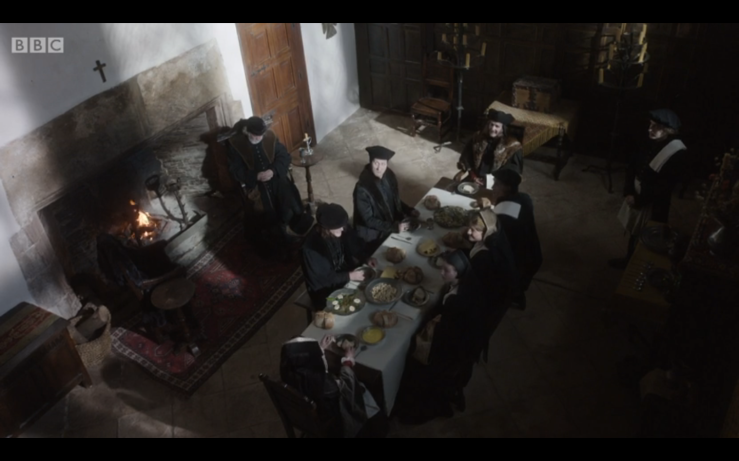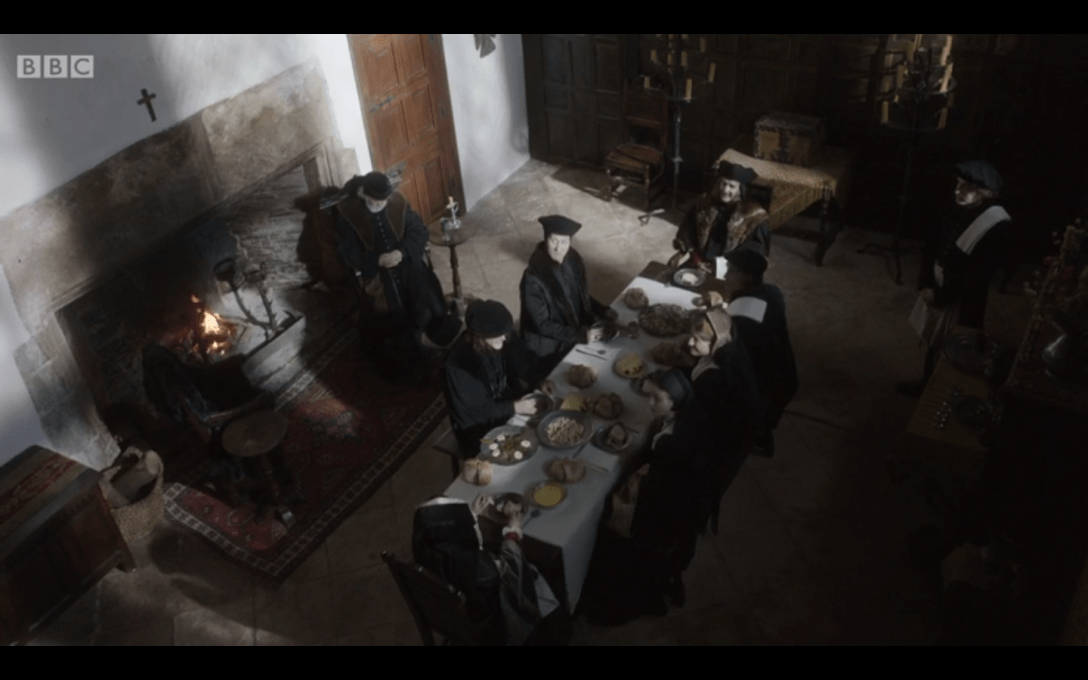Thomas More’s reputation for asceticism is clearly reflected in the BBC’s new adaptation of Hilary Mantel’s Wolf Hall. In episode 2 Stephen Gardiner mutters over a dull and sparse-looking dinner at More’s house that there is absolutely no danger of the household Fool’s excitable behaviour resulting from too rich a diet; shortly afterwards, on the boat journey back to Westminster, he complains to Thomas Cromwell how hungry he is. In contrast we hear that Cardinal Wolsey, even as he travels towards his final downfall, asks his loyal servants urgently to send him quails. Food imagery is used to nice effect to tell us most of what we might need to know about the natures of these men—and the nature of their enmity with one another—on multiple levels.

Episode 2 of BBC TV’s adaptation of Wolf Hall, minute 20:47. First shown: 9pm 28 Jan 2015. © BBC
Likewise, in More’s own island state of Utopia, food-related imagery operates as an effective satirical device and a means of pointing to the everyday realities of life in a better society. Descriptions of communal dining and the collective harvests brought home by city and country dweller alike point the reader to the possibilities of a society in which every citizen contributes to both the production of its sustenance and its enjoyment. Straightforward social and cultural themes such as good husbandry and good eating—including a clear indication of what the right dietary choices are and what they say about people—ground the fiction, underpinning the radical with the commonplace and thus making Utopia a reasonable account of what might be possible.
But Utopians are not the hair-shirted ascetics More himself is often depicted to be. While at pains to point out they chiefly value the joys of the mind, they also pursue the enjoyment of good health, and “the delight of eating and drinking, and whatsoever hath any like pleasantness, they determine pleasures much to be desired.” (83) Individual bodily gratification, experienced without gluttony and excess but with an enjoyable “delectation” in both food and drink, contributes to the fitness and happiness of the body politic. (81-82)
By contrast, the vain and worldly, more impressed with wealth, title and display than simple pleasures and good human fellowship are unable to eat well. Subject to poor taste and bad judgement in their food (as in everything else), they are likely “to accept bitter or sour things for sweet things”. (81) The Utopians’ exploitation of the Zapoletes as mercenary soldiers is partly justified by descriptions of their uncivilised eating habits: “abhorring from all delicate dainties”, they live in ramshackle houses, foraging and hunting rather than cultivating the land. (101) Similarly their bondsmen (or slaves) are said to have an innately corrupt nature, reflected in their willingness to undertake animal slaughter. (64) Though they might enjoy eating meat or fish prepared at a safe distance from the city, no Utopian has blood on his or her hands.
While Utopians eschew boisterous behaviour and excessively sumptuous fare, their communal dinners are not the sparse and joyless affairs served up by More in Wolf Hall. The dining room is designed to be calm and orderly, with due reverence given to the elderly, but children and adults mix at the tables and lively conversation is encouraged. The food is far better than anything one could prepare at home, and within the Utopian order, pleasure and engagement of all the senses is essential. Indeed, “No supper is passed without music. Nor their banquets lack no conceits nor junkets. They burn sweet gums and spices or perfumes and pleasant smells, and sprinkle about sweet ointments and waters, yea, they leave nothing undone that maketh for the cheering of the company. For they be much inclined to this opinion: to think no kind of pleasure forbidden whereof come no harm.” (67)
Whatever the truth of dinner at Thomas More’s house—and whether he allowed himself or his guests this kind of sensual gratification at dinner time or not—I find it very encouraging to consider that from the moment the term utopia was coined it required full exercise of all of the pleasures of the table.
[Page references are to the 2008 OUP paperback edition of Utopia. See: More, Thomas, Francis Bacon, and Henry Neville. Three Early Modern Utopias: Utopia, New Atlantis and the Isle of Pines. Translated by Ralph Robinson. Oxford: Oxford University Press, 2008.]

Lovely piece, thanks
Sent from my iPhone
LikeLike
Thank you Paul!
LikeLike